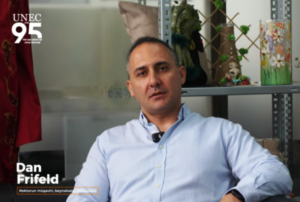Implementation of the PBL Approach at UNEC: “This Method Enhances Students’ Motivation to Learn”
 As part of the recent innovations introduced to the content and methodology of instruction at UNEC, Project- and Problem-Based Learning (PBL – Project-Based Learning and Problem-Based Learning) approaches have been adopted.
As part of the recent innovations introduced to the content and methodology of instruction at UNEC, Project- and Problem-Based Learning (PBL – Project-Based Learning and Problem-Based Learning) approaches have been adopted.
The project is led by Israeli international expert and advisor to the UNEC rector, Mr. Dan Freifeld, who shared his insights on the application of the PBL method:
“We have initiated the implementation of innovative teaching methods at UNEC, with the adoption of the PBL approach being the first step in this direction. PBL – that is, project-oriented learning – fosters an environment in which students do not merely receive knowledge passively but engage in the learning process actively. In this context, the teacher assumes a new role by becoming a participant in the process alongside the student, engaging in joint reflection, research, and project development. The teacher is no longer a transmitter of information, but a co-constructor of the learning experience.”
Elaborating on the benefits of the PBL method, Mr. Freifeld emphasized that this approach aligns with the evolving demands of the modern labor market:
“Why is this important? Because, in the 21st century, theoretical knowledge alone is insufficient. The core competencies sought after in the labor market — namely, communication, teamwork, adaptability, and creativity — commonly referred to as soft skills, are best cultivated through such pedagogical methods. Project-based and problem-based learning equip students with these essential competencies.”
Mr. Freifeld noted that two parallel approaches are currently being pursued at UNEC:
“In project-based learning, instructors and students collaborate to address a particular issue. For example, students may investigate the issue of plastic waste in urban areas, identify its root causes, and propose practical solutions.
In problem-based learning, students engage with more realistic and socially oriented issues. For instance, they may work on a real-world challenge related to individuals with disabilities. By interacting directly with the affected individuals, students identify specific needs, develop prototypes, and conduct testing. The primary aim is to evaluate whether the proposed solution is viable in real-world conditions.”
In conclusion, Mr. Freifeld highlighted that this methodology is being implemented at UNEC for the first time and expressed appreciation for the students’ positive response:
“I believe this approach significantly enhances students’ motivation to learn. They no longer perceive the subject as merely a course to complete, but rather as a process that is closely connected to real-life applications. This perspective will undoubtedly contribute to their future success in the labor market.”